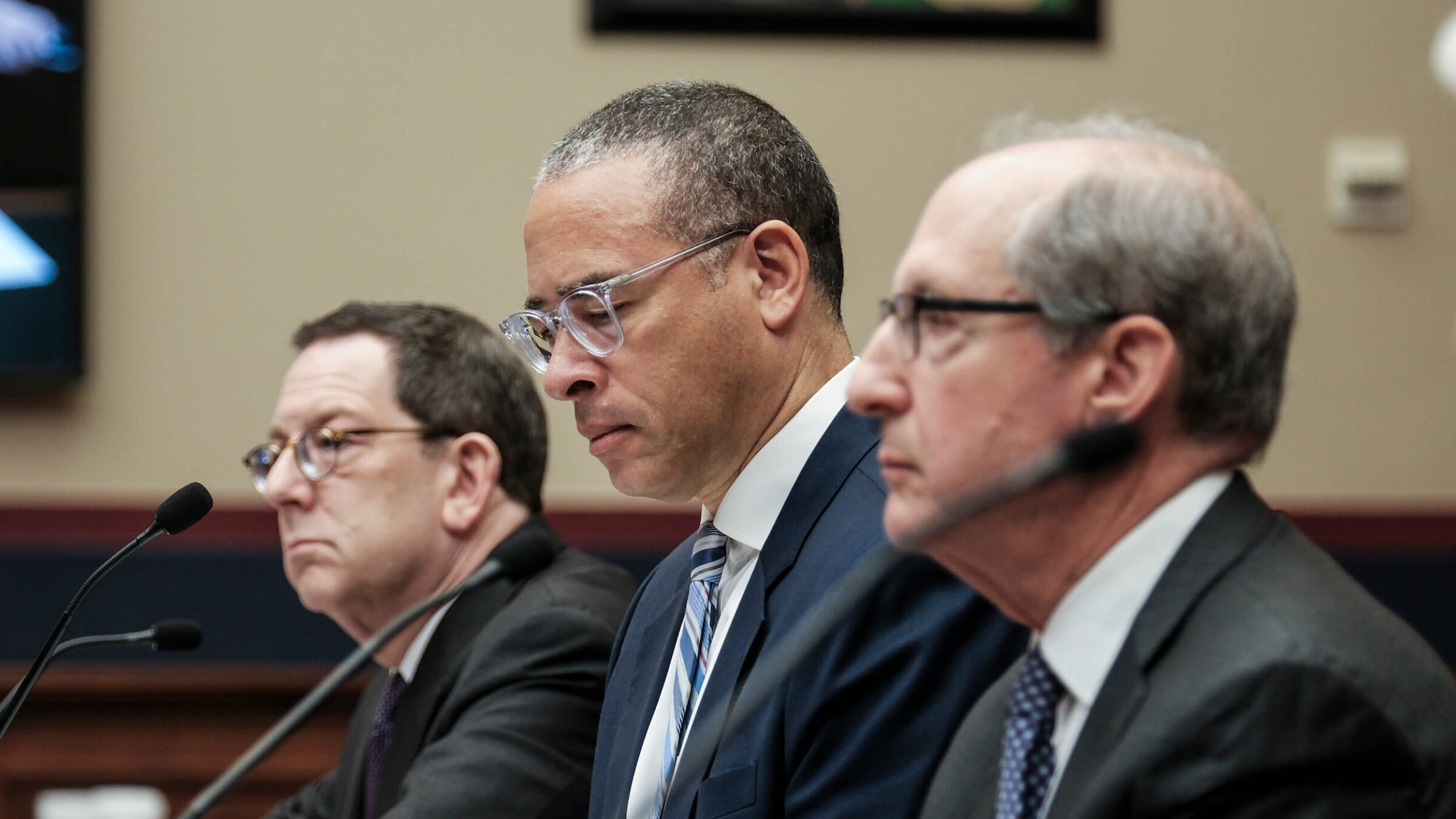I’m a Jew who teaches at Rutgers. Our campuses must stop trying to pacify the government over antisemitism
A spate of recent university settlements with the Department of Education has troubling implications for free speech

Michael Schill, president of Northwestern University; Jonathan Holloway, president of Rutgers University; and Frederick Lawrence, former president of Brandeis University, testify at a hearing on May 23, 2024 in Washington, D.C. Photo by Michael A. McCoy/Getty Images
In the wake of student protests over Israel’s war in Gaza, we are now witnessing a bipartisan assault on protest and free speech on campus — one that is, shockingly, being supported by many university administrators.
The tools are lawsuits and civil rights complaints filed with the U.S. Department of Education, and the targets are primarily pro-Palestinian student and faculty groups. And universities are caving under the pressure. Several — most recently Johns Hopkins — have reached agreements with the DOE Office of Civil Rights over alleged bigotry on campus related to conflicts over the Israel-Hamas war.
These settlements — four at higher-ed institutions so far since December, including one at Rutgers, where I teach journalism — are a threat to the First Amendment and to academic freedom. They come after 15 months of campus activism in support of Palestinian rights, including encampments in the spring — protests that many pro-Israel groups have claimed are inherently antisemitic. But the claim that these campuses are actually hotbeds of anti-Jewish activism is often dubious.
At least, that’s how I see the situation at Rutgers, where I have taught since 2013. I’ve attended several campus protests, sometimes as an observer, occasionally as a participant.
These protests are boisterous, and sometimes the language exceeds what I as a Jew find comfortable to experience. And while there have been acts of actual harassment — including threats of violence made toward both Jewish and Muslim students, and a break-in at and vandalism of the Rutgers Center for Islamic Life — it is clear that most of the nearly 450 incidents chronicled against Jews and Muslims in the DOE’s Rutgers report were tied to slogans chanted at rallies, and fliers posted around and on campus.
What this tells me: Most of what has been flagged by the DOE should be considered protected speech, even if it was shocking or even hateful.
I myself have heard antisemitic tropes and arguments at Rutgers protests. But quenching protests on that basis misdirects our attention. Protests, by their very nature, are meant to shock us out of their apathy; when our response is to say the methodology behind the shock was incorrect, we can end up keeping ourselves from confronting the societal issues that most pressingly require our attention. The Rev. Martin Luther King Jr. said the goal of direct action is to create a crisis, so that such issues “can no longer be ignored.”
We shouldn’t tolerate systematic harassment through protests. But given the diverse makeup of the spring protests — at Rutgers and across the country, the organizers and participants included Jews, Muslims, and people of other faiths and no faith — I find the notion that protesters targeted Jewish students and faculty members hard to credit. The question should really be: Do we care about teaching students that civic engagement is important, and must be undertaken in good faith?
At Rutgers, the response to a year of protests — including those at which I heard troubling rhetoric about Jews — has been clearly aimed at quashing student action, a tactic that will teach students nothing.
The university imposed new rules on protest at the start of the 2024 fall semester that required advanced permission; banned actions on the main campus quad; and set aside a little-used and isolated field for future actions. My students interviewed faculty unions and student groups, most of whom were critical of the new rules, which have largely been ignored — although the Jan. 2 settlement reached by Rutgers with the DOE may cause the administration to more aggressively police activism on campus.
The settlement requires the university to engage in a series of actions designed to address what the DOE claims is a campus culture rife with hostility, including “against students on the basis of shared Jewish ancestry and/or Israeli national origin and ancestry” — with 300 incidents being reported. The report also identifies “147 reports of alleged discrimination, including harassment, against students on the basis of shared Palestinian, Arab, South Asian, and/or Muslim ancestry.”
Rutgers spokesperson Dory Devlin said the “voluntary agreement” is consistent with the university’s commitment to stand “firmly against discrimination and harassment in all its forms.” Devlin also pointed to the university’s statement on academic freedom and free speech, which extends protection to “all members of our community” against “institutional discipline in the exercise of these rights.”
But the layer of bureaucracy created by the settlements, added to the influx of new rules governing protests at Rutgers and elsewhere, will inevitably chill speech on campus — in particular speech critical of Israel and the devastating toll of its military actions in Gaza.
The tent encampments that sprouted at campuses across the country last spring were meant to force American universities — and the federal government — to confront the real horrors of the war in Gaza, and act in response. Instead politicians like Rep. Virginia Foxx, (the Republican chair of the House Committee on Education and the Workforce) and Rep. Elise Stefanik, (President-elect Donald Trump’s pick to serve as United Nations ambassador) responded by demonizing college students to score political points.
It’s true that this kind of disruptive activism has never been popular with the broader public. Ronald Reagan won his first gubernatorial race in California at least partly because of his attacks on student protests. Richard Nixon won the presidency in 1968 on a law-and-order platform. Trump himself has been outspoken and sometimes even threatening in his criticism of the student protest movement against Israel.
But popularity is an imperfect barometer for determining what is right. In settling with the DOE, university administrations are helping to enable capitulation to larger anti-democratic forces. In the guise of protecting civil rights and fighting antisemitism, the DOE, state governments, university administrators, and others in positions of power are cracking down on dissent.
And just as troubling as the damage these agreements may do to our free speech and assembly rights is the willingness of university leaders to “obey in advance” — which the historian of fascism Timothy Snyder describes as “teaching power what it can do.”

















